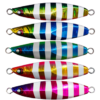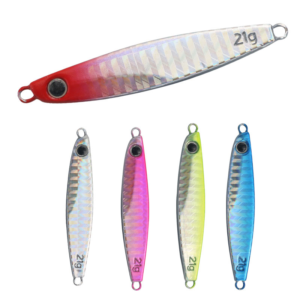Hard Metal jig Lead Fish Lure 40g 60g 80g 100g 100g
Informations complémentaires
| Couleur | optional |
|---|---|
| Material | Lead, metal |
| Weight | 40g,60g,80g,100g,160g |
| Model | TX-05 |
Product Details:
The Ultimate Guide to Fishing Lures: Embracing Lead Material for Optimal Performance
When it comes to fishing, choosing the right gear is crucial for a successful outing. Among these essential tools, fishing lures play a pivotal role in attracting fish and enticing them to bite. One particularly effective material for crafting these lures is lead. In this comprehensive guide, we’ll explore the many benefits of using lead-based lures, discover their diverse types, and share expert tips to elevate your fishing game.
Understanding Lead Material in Fishing Lures
Lead has been a staple in the fishing industry for decades, favored for its unique properties that enhance lure performance. Its high density allows for a compact design, offering significant weight that aids in sinking to optimal depths quickly. Lead’s malleability also facilitates the creation of intricate designs, ensuring that lures can accurately mimic the swimming actions of real baitfish. This attention to detail is what makes lead lures such an effective tool for anglers seeking to entice a variety of fish species.
Types of Lead Fishing Lures
Anglers can choose from an array of lead lures, each tailored for different fishing environments and techniques. Let’s delve into some of the most popular options:
- Jig Heads: A time-tested choice, jig heads combine a weighted head with a hook, making them ideal for vertical presentations and fishing near the bottom. Perfect for catching bass, walleye, and panfish.
- Spoons: Characterized by their unique shape, spoons emulate the erratic movement of dying baitfish. The reflective surface and wobbling action can entice fish from a distance, making them particularly effective in both freshwater and saltwater fishing.
- Swimbaits: These lures are designed to imitate the natural movement of baitfish. With a soft plastic body encasing lead, swimbaits offer versatility and a realistic presentation, attracting species like largemouth bass and pike.
- Poids Drop Shot: Used in drop shot fishing, these weights allow anglers to present baits suspended above the lake or ocean floor. This technique can be especially effective for finicky fish.
- Carolina Rigging: Lead weights are a critical component of Carolina rigs, allowing for distance casting while keeping the bait presented just off the bottom.
Lead Lures: Advantages Over Alternatives
One of the primary benefits of using lead in fishing lures is its weight-to-volume ratio, which allows for more compact designs without sacrificing performance. This characteristic translates to improved casting distances and better underwater control. Additionally, lead lures are typically more durable, holding up against rocky structures and rough handling better than softer or lighter materials. The versatility of lead also means it can be molded into complex shapes, which can effectively mimic the behavior of live prey.
Environmental Considerations with Lead
While lead lures offer undeniable advantages, they do raise significant environmental concerns. The toxicity of lead presents a risk to aquatic life, especially if lures are lost or discarded in the water. Some states and regions have initiated bans on lead tackle to protect vulnerable wildlife. As responsible anglers, it is essential to be aware of these restrictions and to consider using alternative materials when fishing in sensitive ecosystems, like waterways frequented by migratory birds. Embracing lead-free alternatives can ensure our fishing practices do not compromise the health of our natural resources.
Tips for Using Lead Fishing Lures Effectively
To maximize your success with lead-based lures, consider integrating these expert tips into your fishing routine:
- Observe Local Baitfish: Take note of the species of baitfish in your fishing area and select lures that mimic their size and color.
- Experiment with Techniques: Vary your retrieval speeds and patterns to discover what entices fish most effectively—sometimes a slow, steady retrieve is key, while other times, a rapid jerk can provoke a strike.
- Be Mindful of Weather Conditions: Fish behavior changes with the weather; adjust your lure choice and depth accordingly. For instance, during overcast days, brighter lures can stand out better.
- Line Selection: Pair your lead lures with the appropriate line type and weight. Braided lines offer strength with minimal stretch, while monofilament lines enhance sensitivity and buoyancy.
- Storage and Care: Properly store lead lures to avoid scratches or damages that can affect performance. A tackle box with individual compartments helps keep lures organized and in great shape.
Staying Updated on Regulations
Fishing regulations can change frequently, particularly when it comes to the use of lead in tackle. Check with local wildlife authorities or fishing organizations to stay informed about current rules and best practices. Not only does this ensure compliance, but it also promotes the conservation of local fish populations and habitats.
Conclusion
Choosing lead fishing lures can significantly enhance your fishing experience, offering a combination of performance and reliability. By familiarizing yourself with the types, benefits, and responsible use of lead lures, you’ll be better equipped to improve your chances of a successful catch. Remember to stay environmentally conscious and up-to-date with regulations to support sustainable fishing practices. With careful consideration and the right techniques, you can harness the power of lead-based lures for an enjoyable and productive fishing adventure. Happy fishing!







